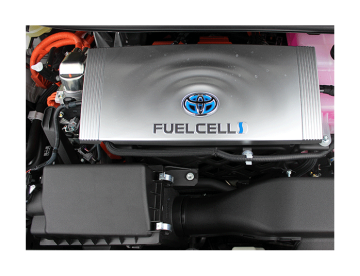
By Andrew Boada, Editor At Large
Most OEMs are funding research and development of fuel cell vehicles (FCVs), but their collective efforts have been dwarfed by their on-going investment in battery electric vehicles (BEVs). Is that because hydrogen-fueled vehicles, as Elon Musk once put it, are “an incredibly dumb idea”? If not, then what’s behind the apparent relative lack of interest in FCVs in the auto industry?
The Advantages of Hydrogen – A Rather Short List
FCVs have two clear advantages over BEVs. First, a hydrogen tank can be filled much faster than a BEV’s battery can be recharged. While it can take at least a half hour, and usually more like several hours, to fully recharge a BEV’s battery, it takes around five minutes to fill a tank with hydrogen, roughly the same amount of time to fill a tank with gasoline. Second, fuel cell vehicles typically get internal combustion engine-like range from a single tank of hydrogen, while current BEVs fall significantly short of that mark.
And that’s pretty much where the list of the clear advantages of hydrogen over batteries ends.
The Disadvantages of Hydrogen
There are a whole host of reasons why hydrogen is inferior to batteries as the basis for a power train, but most of them boil down to the fact it’s far more energy- and cost-efficient to get electricity into a battery than hydrogen into an FCV tank, by a factor of three to six times.
For starters, this is because we obtain hydrogen by splitting it out of water molecules (H2O), which takes a bundle of electricity. In fact, it takes 50 kWh of electricity to produce a kilogram of hydrogen, and that’s only enough to propel a mid-sized sedan FCV like the Toyota Mirai a distance of about 57 miles. If, instead of using that electricity just to make hydrogen it’s used to charge the battery of a Chevrolet Bolt, it would propel that vehicle something like 170 miles, or almost three times as far.
The energy efficiency disparity doesn’t end there though, because in order to make hydrogen a useful fuel, it needs to be compressed or liquefied. That also requires an energy input. Then it needs to be transported from wherever it was produced to wherever it is to be sold, which amounts to yet another energy input.
Further eroding hydrogen’s energy economy is the problem of storing it. Even compared to other atoms and molecules, the hydrogen molecule is tiny, so tiny that it passes relatively easily through the metal walls of vessels we use to contain it. Trying to store the stuff in virtually any containment material is like trying to store helium in a balloon: it may take some time, but eventually, it leaks out.
How long? Well, if you were to fill up the hydrogen tank of your fuel cell vehicle and then park it in your garage for a week, you might easily come back on day seven to discover that as much as half the hydrogen you put in the tank had escaped. So, consider leakage (read: waste) as another added cost of hydrogen as a vehicle fuel.
Finally, fuel cells are more expensive to manufacture than batteries. This is due in part to the fact that platinum, which is rarer and more expensive than gold, is used extensively in critical fuel cell components. This expense contributes to the steep price of Toyota’s Mirai, a Prius-like FCV that starts at $59,000. To be fair, production at a larger scale as well as improvements in fuel cell technology will almost certainly continue to bring FCV costs down, but much the same can be said about the cost trajectories of BEVs, hybrids and even internal combustion engine vehicles.
So that’s that then: it would appear that hydrogen is an expensive energy hog destined for the technological dust bin that merely enables vehicles to do what other power trains are capable of delivering more cheaply, right?
Not necessarily.
Hydrogen – Maybe Right for Long-Haul Trucking
There is at least one form of transportation in which fuel cells may have a major advantage over battery electric drive trains: long-haul trucking. Here, hydrogen’s advantage is as much due to the weaknesses inherent to batteries as it is to the strength of fuel cells. And it’s for this potential general reason that OEMs like Toyota, Honda and GM remain committed to developing FCV technology.
Succinctly put, a fuel cell long haul truck (FCLHT) should be able to haul more goods from one place to another per journey, and faster than a battery electric long-haul truck (BELHT). That’s because the batteries powerful enough to drive a big rig would have to be much larger and heavier than a fuel cell drive train, which would cut down a BELHT’s cargo capacity. A fuel cell-powered big rig’s greater range and significantly shorter refueling time means it could also be quicker to make deliveries. These efficiencies could well offset an FCHLT’s higher acquisition and fuel costs.
Policy Makers Could Inadvertently Make Hydrogen King
When it comes to sedans, SUVs and light-duty trucks, current technology makes BEVs more price-competitive than hydrogen. That calculus could be flipped on its head, however, if government policy-makers install a decarbonization strategy that heavily expands wind and solar power.
If policy takes us down the renewable-dependent path, the result will be rapidly rising retail electricity prices, as has already occurred in Germany and California, owing, in part, to the fact that renewable plants must be created as a parallel source of electricity instead of replacements for fossil-fuel plants that can be retired. Ironically, while retail electricity prices are forced higher, wholesale prices – the kind factories pay – could frequently drop or go negative. The reason is that production of wind and solar-generated electricity is highly variable, fully dependent on the amount of wind and sun available at any time. Inevitably, there is at times more renewably generated electricity than utility customers demand, and this more frequently as renewable electricity becomes more plentiful. Since this excess supply can’t be stored, the utility companies that generate it would be forced to sell it at rates below retail prices, or even pay others to take it.
Periods of cheap electricity on the wholesale market that fuel cell factories could contract to buy might eliminate the otherwise prohibitive energy cost associated with hydrogen fuel production and delivery. But since the retail price of electricity would remain unchanged, owners of BEVs would enjoy no similar advantage, largely because it’s much harder and more expensive to stockpile large quantities of energy in batteries than it is in hydrogen.
Electricity remains the future favorite
So, for the foreseeable future, electricity seems to be the fuel of the future, at least for sedans and light-duty vehicles. As I’ve written in the space before, EV technology faces continuing challenges to match the range and refueling time of the internal combustion engine, as well as a recharging infrastructure sufficient to duplicate the convenient fossil fuel station. The latter is also true for hydrogen, where the infrastructure is minuscule and virtually non-existent outside California.
For now, though, while FCV sedans are on the market, they’re impractical alternatives for fleets and unlikely to become a serious alternative for the foreseeable future. But stay tuned.




